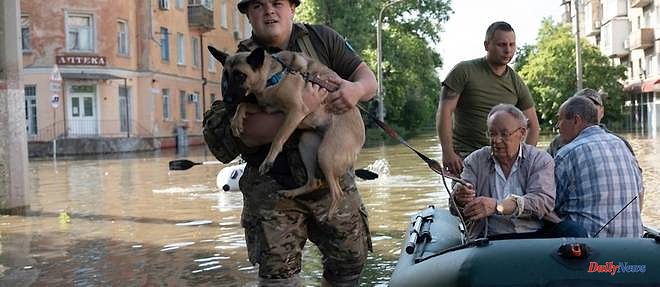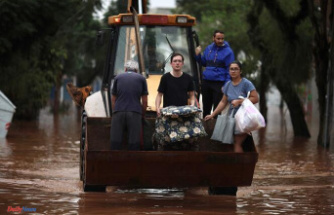Muddy water is already reaching the rooftops of the southern Ukrainian city of Kherson, and rescuers are still scrambling to evacuate in small boats and amphibious vehicles its residents, some of whom have only their identity papers.
"We no longer have a house. The water covered it up to the roof. You can't even see the roof," said Dmitri Melnikov, 46, as he got out of an amphibious vehicle alongside his five children.
"The whole area is now under water. It's above ground level," he said, holding his daughter's hand.
Tuesday's destruction of the Kakhovka hydroelectric dam, upstream of the Dnieper, caused flooding both on the bank of this river controlled by Ukraine, including Kherson, and on that occupied by the Russians. Both sides blame each other for this disaster and proceed to evacuations.
According to the Ukrainian authorities, the waters of the Dnieper have risen by five meters and could continue to progress during the day.
Police, rescuers and soldiers rush to evacuate the population, including many elderly people, as well as pets. Some Kherson residents took matters into their own hands by diving into the water, while a man paddles on an inflatable mattress.
Natalia Korj, 68, smiles as she disembarks barefoot, wet clothes, on dry land with a few bags of personal effects, helped by two rescuers.
"All my rooms are under water. My fridge is floating, the freezer, everything," she says.
She had to swim to escape her house. His legs are covered with scratches, his hands are shaking with cold. "We are used to (artillery) fire but a natural disaster is a real nightmare," she laments.
She fears for her two dogs and her cat, which she could not save because she could not reach them.
"Local residents send us their geolocation when possible and we collect them," said Serguiï, a 38-year-old police officer who helps coordinate rescue efforts.
Svetlana Abramovich, 56, is organizing the rescue of 22 residents still trapped in a five-story building whose ground floor is flooded.
"The water started coming in last night and 18 hours later it flooded the building and the courtyard. The water came in through the doors and into the ground floor apartments," she said. .
Some of the evacuees are smiling as they arrive to safety, others are shaking and crying. They barely react to the sound of an anti-aircraft warning siren, Kherson being regularly bombarded by Russian forces.
"Over there, it's water. Here, it's explosions," says Svetlana.
Dmitry, for his part, says he is indifferent to the bombardments, he has gotten used to it. However, he decided to leave this city.
"We have been here since the beginning of the war, we survived the occupation. But now we have no house, nothing, no work. We don't want to leave but what can we do?", he laments.
A man wrapped in a blanket and wearing a headlamp hugs his cat, while a woman in a floral dress and sunglasses holds a visibly nervous gray and white cat.
Volunteers take families to the bus station where some take a free bus to the nearby city of Mykolaiv. There is also a train for evacuees.
Many, however, prefer to stay in Kherson and nearby villages, hoping that the waters will eventually recede.
Sergiy Trofimov, 34, a volunteer for the humanitarian organization Proliska, has been working at the bus station since the morning, helping people find transport.
"People want to wait for the water level to drop, so they don't want to go too far," he explains. "They want to go home as soon as possible."
06/07/2023 16:01:09 - Kherson (Ukraine) (AFP) - © 2023 AFP












